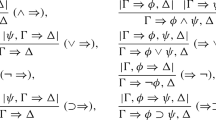Abstract
In the paper, the first-order intuitionistic temporal logic sequent calculus LBJ is considered. The invertibility of some of the LBJ rules, syntactic admissibility of the structural rules and the cut rule in LBJ, as well as Harrop and Craig's interpolation theorems for LBJ are proved. Gentzen's midsequent theorem is proved for the LBJ' calculus which is obtained from LBJ by removing the antecedent disjunction rule from it.
Similar content being viewed by others
References
R. Alonderis, On intuitionistic branching tense logic with weak induction,Lith. Math. Society Scientific Works,2, 295–301 (1998).
H. Andreka, J. Nemeti, and J. Sain, On the strength of temporal proof,LNSC,379, 135–144 (1989).
M. Baaz, A. Leitsch, and R. Zach, Completeness of a first-order temporal logic with time gaps,Theoret. Comput. Sci.,160, 241–270 (1996).
R. Dyckhoff, Contraction free sequent calculi for intuitionistic logic,JSL,51, 795–807 (1992).
W. B. Ewalds, Intuitionistic tense and modal logic,JSL,51, 166–179 (1986).
K. Gödel, Über formal unentscheidbare Sätze der Principia Mathematica und verwandter Systeme,Monatsh. Math. Phys.,38, 173–198 (1931).
H. Kawai, Sequential calculus for a first-order infinitary temporal logic,Z. Math. Logik Grundlag. Math.,33, 423–452 (1987).
F. Kröger,Temporal Logic of Programs, EATCS Monographs in Computer Science, vol. 8, Springer, Berlin (1987).
F. Kröger, On the interpretability of arithmetic in temporal logic,Theoret. Comput. Sci.,73, 47–60 (1990).
D. Leivant, Proof theoretic methodology for Propositional Dynamic Logic, Lecture Notes in Computer Science,107, 356–373 (1981).
L. Maksimova, Temporal logics of “the next” do not have the Beth property,J. Appl. Non-Classical Logics,1(1), 73–76 (1991).
H. Nishimura, Semantical analysis of constructive PDL,Publ. Res. Inst. Math. Sci.,18(2), 427–438 (1982).
H. Ono, On some intuitionistic modal logics,Publ. Res. Inst. Math. Sci.,13, 687–722 (1977).
J. R. Shoenfield, Open sentences and the induction axiom,JSL 23(1), 7–12 (1958).
J. C. Shepherdson, Non-standard models for fragments of number theory. Symp. Theor. Models, Amsterdam, pp. 137–170 (1965).
J. C. Shepherdson, The rules of induction in the free variable arithmetic based on + and.Am. Fac. Univ. Clermont. Math.,4, 25–31 (1967).
A. Szalas, A complete axiomatic characterization of first order temporal logic of linear time,Theoret. Comput. Sci.,54, 199–214 (1987).
A. Szalas, Concerning the semantic consequence relation in first-order temporal logic,Theoret. Comput. Sci.,47, 329–334 (1986).
G. Takeuti,Proof Theory, North-Holland, Amsterdam (1975).
B. Volozh, M. Matskin, B. G. Mints, and E. Tyugu,PRIZ System and the Propositional Calculus, Kibernetika and Software (1963).
N. Vorob'ev, A new algorithm for derivability in a constructive propositional calculus,Amer. Math. Soc.,94, 37–71 (1970).
D. Wijesekera, Constructive Modal Logics I,Ann. Pure Appl. Logic,50, 271–301 (1990).
Author information
Authors and Affiliations
Additional information
Published in Lietuvos Matematikos Rinkinys, Vol. 40, No. 3, pp. 255–276, July–September, 2000.
Rights and permissions
About this article
Cite this article
Alonderis, R. Proof-theoretical investigation of temporal logic with time gaps. Lith Math J 40, 197–212 (2000). https://doi.org/10.1007/BF02465129
Received:
Issue Date:
DOI: https://doi.org/10.1007/BF02465129




